 |
Convert MLP to AMR
|
Total Audio MP3 Converter converts MLP files to AMR format.
The software is an all in one audio converter that supports more than 90 audio
and video files as input, and converts to popular formats such as MP3, WAV, AAC,
M4A, OGG, WMA, and AMR.
Total Audio MP3 Converter also supports batch conversion, and is full compatible
with Vista and Windows
7.
- Free Download
Total Audio MP3 Converter here and then install the software
by instructions
- Launch Total Audio MP3 Converter
- Choose MLP Files
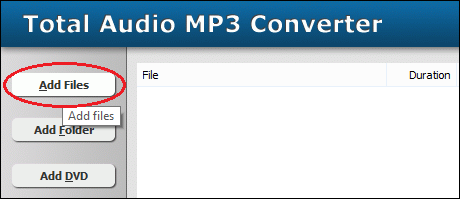
Click "Add Files" to choose MLP files and then add them to conversion
list.
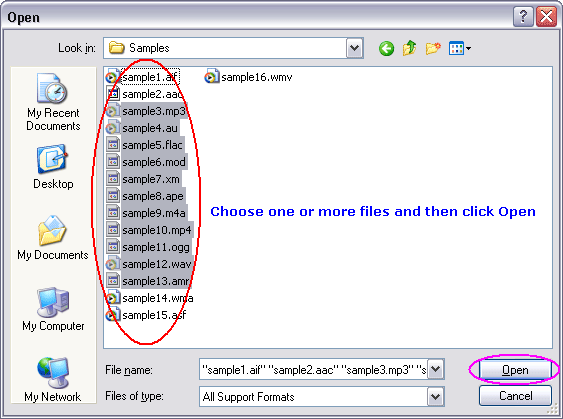
Choose one or more MLP files you want to convert and then click Open.
- Choose "to AMR"
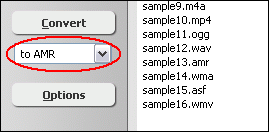
- Convert MLP to AMR

Click button "Convert" to convert all MLP files to AMR format.
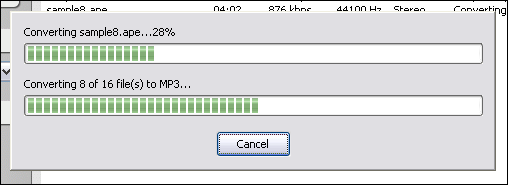
The software is converting MLP files to AMR format.
- Play & Browse
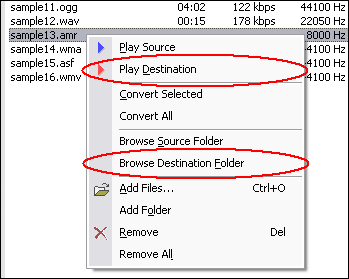
When conversion completes, you could right-click converted item and choose "Play
Destination" to play the destination file; or choose "Browse Destination
Folder" to open Windows Explorer to browse the destination file.
Top
What is MLP?
MLP (Meridian Lossless Packing) is a lossless coding system for use on high-quality
digital audio data originally represented as linear PCM. High quality audio these
days implies high sample rates, large word sizes and multichannel.
The MLP is used by Meridian codec. Audio compression used on DVD video discs.
MLP performs lossless compression of up to 63 audio channels including 24-bit
material sampled at rates as high as 192kHz.
Lossless compression has many applications in the recording and distribution
of audio. In designing MLP we have paid a lot of attention to the application
of lossless compression to data-rate-limited ransmission (e.g. storage on DVD),
to the option of constant data rate in the compressed domain and to aspects that
impact on mastering and authoring. MLP was targeted to provide:
- Good compression of both peak and average data rates.
- Use of both fixed and variable-rate data-streams.
- Automatic savings on bass-effects channels.
- Automatic savings on signals that do not use all of the available bandwidth
(e.g. sampled at 96kHz).
- Automatic savings when channels are correlated.
- Comprehensive metadata.
- Hierarchical access to multichannel information.
- Modest decoding requirements.
MLP provides for up to 63 channels, but applications tend to be limited by
the available data rate. To aid compatibility, MLP uses a hierarchical stream
structure containing multiple substreams and hierarchical additional data. With
this stream structure decoders need only access part of the stream to playback
subsets of the audio. Suitable use of the substreams also allows 2-channel compatibility;
a low-complexity decoder can recover a stereo mix from a multichannel stream.
Figure 1 gives an overview of the process of losslessly compressing a stream containing
multiple audio channels and auxiliary data onto a disc.
What is AMR?
Adaptive Multi-Rate (AMR) is an audio data compression scheme optimized for speech
coding. AMR was adopted as the standard speech codec by 3GPP in October 1998 and
is now widely used in GSM and UMTS. It uses link adaptation to select from one
of eight different bit rates based on link conditions. AMR is also a file format
for storing spoken audio using the AMR codec. Many modern mobile telephone handsets
will allow you to store short recordings in the AMR format. There also exists
another storage format for AMR that is suitable for applications with more advanced
demands on the storage format, like random access or synchronization with video.
This format is the 3GPP-specified 3GP container format based on ISO base media
file format.
Key Features:
- Sampling frequency 8 kHz/13-bit (160 samples for 20 ms frames), filtered to
200-3400 Hz.
- The AMR codec uses eight source codecs with bit-rates of 12.2, 10.2, 7.95,
7.40, 6.70, 5.90, 5.15 and 4.75 kbit/s.
- Generates frame length of 95, 103, 118, 134, 148, 159, 204, or 244 bits for
bit rates 4.75, 5.15, 5.90, 6.70, 7.40, 7.95, 10.2, or 12.2 kbit/s, respectively
- AMR utilizes Discontinuous Transmission (DTX), with Voice Activity Detection
(VAD) and Comfort Noise Generation (CNG) to reduce bandwidth usage during silence
periods
- Algorithmic delay is 20 ms per frame. For bit-rates of 12.2, there is no 'algorithm'
look-ahead delay. For other rates, look-ahead delay is 5 ms. Note that there is
5 ms 'dummy' look-ahead delay, to allow seamless frame-wise mode switching with
the rest of rates.
- AMR is a hybrid speech coder which uses Algebraic Code Excited Linear Prediction
(ACELP)
- The complexity of the algorithm is rated at 5, using a relative scale where
G.711 is 1 and G.729a is 15.
- PSQM testing under ideal conditions yields Mean Opinion Scores of 4.14 for
AMR (12.2 kbit/s), compared to 4.45 for G.711 (u-law)
- PSQM testing under network stress yields Mean Opinion Scores of 3.79 for AMR
(12.2 kbit/s), compared to 4.13 for G.711 (u-law)
Convert MLP to AMR Related Topics:
PVA to AMR,
MLP to AMR,
CAF to AMR,
M2V to AMR,
DV to AMR,
M4B to AMR,
AMR Converter,
ALAW to AMR,
3GPP to AMR,
M1A to AMR,
NUV to AMR,
XVID to AMR,
DVD to AMR,
NSV to AMR,
OMA to AMR,
SHN to AMR,
NUT to AMR,
GXF to AMR,
MTM to AMR,
OGV to AMR,
F4A to AMR,
MOD to AMR,
APE to AMR,
EVO to AMR,
RPL to AMR,
Resample AMR,
FLV to AMR,
FLIC to AMR,
WV to AMR,
VID to AMR,
WM to AMR,
OGM to AMR,
ASF to AMR,
FLAC to AMR,
OGG to AMR,
OGA to AMR,
CD to AMR,
WAV to AMR,
VCD to AMR,
MVI to AMR
|






